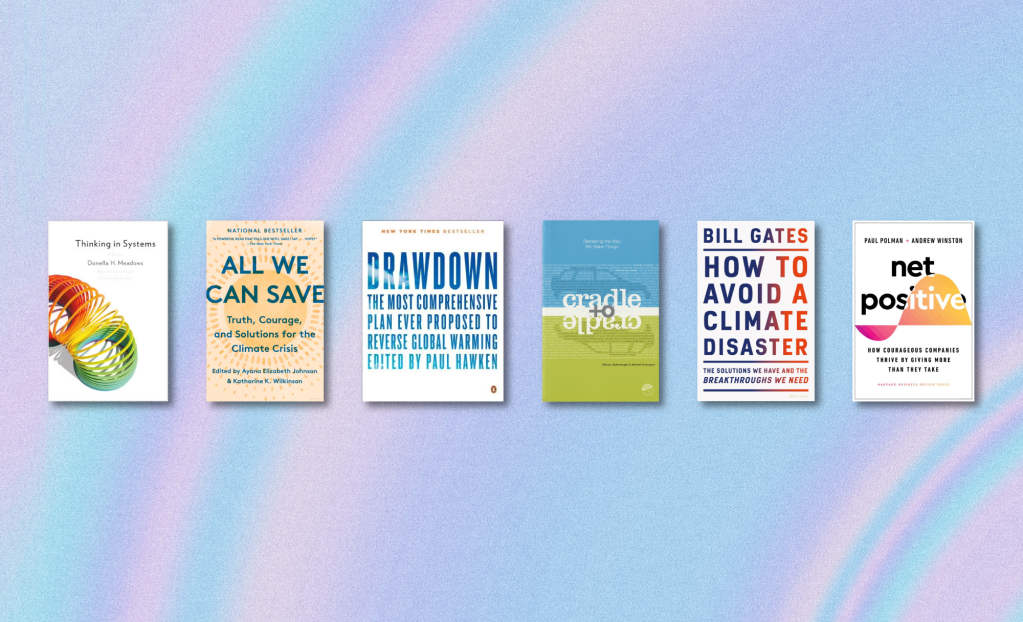6 must-read books for every sustainability pro
Classic business titles appropriate for early-stage practitioners and seasoned sustainability veterans. Read More

The literary canon dedicated to decoding corporate climate strategy has swelled since legendary author John Elkington coined the term “triple bottom line” in his 1997 book “Cannibals With Forks.”
His argument that businesses should be judged on three foundational elements — social justice, economic prosperity and environmental quality — reshaped management practices.
Few other corporate sustainability titles have had the same disruptive impact, but here are six bonafide best-sellers that should also be on every sustainability professional’s bookshelf.
“Thinking in Systems”
By Donella Meadows
“Thinking in Systems” was published posthumously in 2008, more than 15 years after the late scientist and farmer first circulated a draft. It argues that the world’s biggest problems, including environmental degradation, can’t be fixed in isolation “because even seemingly minor details have enormous power to undermine the efforts of too-narrow thinking,” as one description explains. If you’re in a binge-reading mood, revisit Meadows’ earlier book, “Limits to Growth,” her 1972 warning about the dangers of unchecked consumption.
“All We Can Save”
Edited by Ayana Elizabeth Johnson and Katharine Wilkinson
Marine biologist Ayana Elizabeth Johnson and climate drawdown strategist Katharine Wilkinson co-edited this anthology featuring inspirational and passionate essays by 40 women ranging from Indigenous activists to entrepreneurs. It is meant to inspire, as Johnson told me in September 2020, when the book was originally released: “For people who haven’t yet found their role in climate work, we hope that this book will help them see where they fit in. And for people who are already doing the work, we hope that this will help them feel less alone and bolstered for the next years and rounds and decades of the work that needs doing.”
“Cradle to Cradle: Remaking the Way We Make Things”
By William McDonough and Michael Braungart
First published in 2002, “Cradle to Cradle” was co-authored by architect Bill McDonough and chemist Michael Braungart, both already well-regarded for prioritizing environmental concerns in their work. It was one of the first books to espouse a circular economy in which waste from one process becomes a resource for another. Today, with more than 1 million copies in circulation, it’s the centerpiece of countless university courses in industrial design and the inspiration for a widely used product certification framework of the same name.
“Drawdown: The Most Comprehensive Plan Ever Proposed to Reverse Global Warming”
Edited by Paul Hawken
This New York Times best-seller from 2017 outlines 100 practical applications for reducing greenhouse gas emissions, ranging from technologies for clean energy generation to simple but profound ideas, such as educating women and girls in low-income countries about regenerative agriculture and land management practices. Don’t expect lists of specific solutions. This is a guide meant to inform potential entrepreneurs and investors, but the research is continually refreshed as part of Project Drawdown.
“How to Avoid a Climate Disaster: The Solutions We Have and the Breakthroughs We Need”
By Bill Gates
The Microsoft co-founder and philanthropist’s Breakthrough Energy venture firm has funneled more than $2 billion in 160-plus climate tech startups since 2015. Gates has also personally invested more than $1 billion in nuclear company Terrapower. This 2021 book provides a glimpse into Gates’ investment thesis — he’s looking for ways to decrease the “green premium,” or the cost differential between using clean technologies versus ones that will contribute more greenhouse gases.
“Net Positive: How Courageous Companies Thrive by Giving More Than They Take”
By Paul Polman and Andrew Winston
Former Unilever CEO Paul Polman teamed up with consultant and author Andrew Winston to argue that it’s possible for companies to give more to the world than they take. “Net Positive” offers many examples of businesses that have made a practice of considering social and environmental impacts as equal partners to revenue generation — ranging from oft-cited exemplars such as apparel maker Patagonia and IKEA to companies that get fewer headlines but also deserve credit, such as Kenyan telecommunications firm Safaricom and home improvement retailer Kingfisher.
What book would you recommend to other sustainability pros? Share your suggestions at editor@trellis.net.

Subscribe to Trellis Briefing
Featured Reports

The Premier Event for Sustainable Business Leaders
















